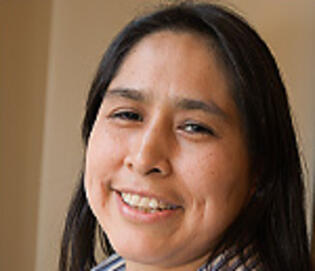
Creative Writing Award Winner 2006
Class of 2008
Sylvia Parker, ‘08 is a graduate of Oklahoma City University with a BFA in Fine Art. She has received a number of recognitions for her painting and photographs. Currently in her first year at US studying to become a Geriatric Nurse Practitioner, this Native American is merging both art and science.
Transcript of the Reading:
You come from a long line of healers
You come from a long line of healers, my aunt said to me the summer before this– before Yale and med-surg, before cadavers and NCLEX questions. I had to remind myself of this many times throughout the semester. I would remind myself of my uncle and great-grandmother, the ways in which they healed and the people they touched. Maybe I should have been a medicine woman, but you have to be chosen and nobody chose me so here I am at Yale, a wannabe nurse, a wannabe nurse practitioner. I am supposedly someone who is learning to heal. So many times I struggled to grasp the smallest of details, those really important ones that keep you from killing a patient. I want to learn. I keep saying to myself, I want to learn. You come from a long line of healers. I remember these words, her embrace and the hopes of my family. So I work, work harder than I ever worked at anything in my life. I remember her words to the class, but it was like she was speaking to me. You do not help me if you are great with patients and don’t know the medicine; you don’t help me if you are great with medicine, but terrible with patients. You have to be both.
You come from a long line of healers. So I worked harder than I ever worked in my life. I cried. My heart broke when my daughter cried for me not to leave her in the morning. I begged myself for one less hour of sleep each night. I leaned on those who understood. I resented those who didn’t. In the end I sat beside every patient and I listened. Maybe she should have said if you cannot listen you are no good to me. Period. I did what my great-grandmother said white people have a hard time doing. I listened. I heard voices. I heard a voice speak of his wife. He kissed her pillow every night and every morning. I lost her, he said. How long ago? I asked. Eighteen years next month. A voice of love. I heard a voice of longing. Is it snowing outside? she asked. She asked again and again. Ninety-five years of life and she was asking about the snow. No, I said. Not yet, I said. She’d tell me about the snow under her feet, her mother’s hand in hers. The hill they’d slide down each winter. Each time she told me her story I’d ask her a question, Do you miss your mother, Ann? Do you miss the snow? Yes, yes, yes, she’d say. A voice of longing. I heard a voice speak clearly, although she barely uttered a word. There was the occasional yes, a whisper of a no. Her chart read non-responsive, doesn’t communicate. Then why did she speak with her eyes every time we turned her to change the dressing on her stage IV ulcer? Her eyes became her voice to me. A voice of loneliness. I brought her a little stuffed monkey on a Saturday. Ask before you visit a patient, they said. Ask? Why? I wanted to give her time, my time. I was taught to go when your elders called. She called me and I went. We talked, I asked her about cooking and children. She smiled about her cooking. She attempted to speak about her children, but only tears came. So I sang her an Indian song, a prayer of healing and hope. As I kissed her head good-bye, I listened one last time. Don’t you ever forget, You come from a long line of healers. And I left her holding my heart. I left with a voice of hope.
